北师大版(2019)选择性必修第四册Unit 11 Conflict and Compromise Lesson3 War Memories 课文讲解 课件(共25张PPT)
文档属性
| 名称 | 北师大版(2019)选择性必修第四册Unit 11 Conflict and Compromise Lesson3 War Memories 课文讲解 课件(共25张PPT) |
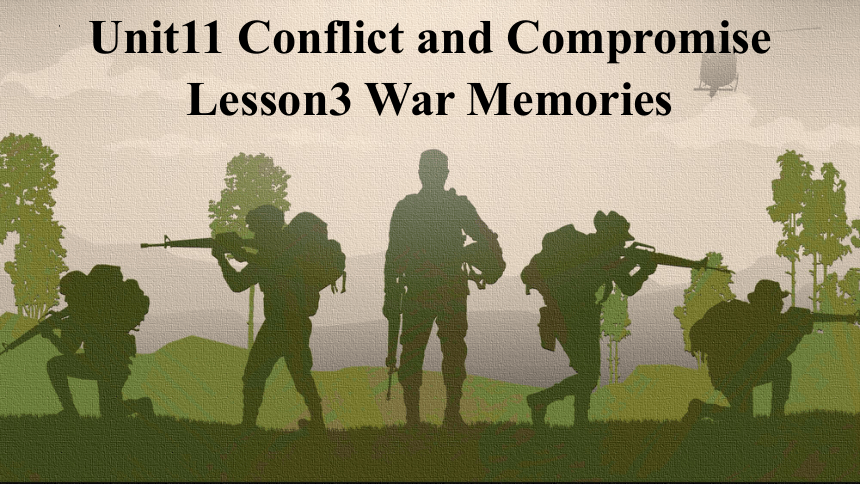
|
|
| 格式 | pptx | ||
| 文件大小 | 4.9MB | ||
| 资源类型 | 教案 | ||
| 版本资源 | 北师大版(2019) | ||
| 科目 | 英语 | ||
| 更新时间 | 2024-06-27 09:03:32 | ||
图片预览

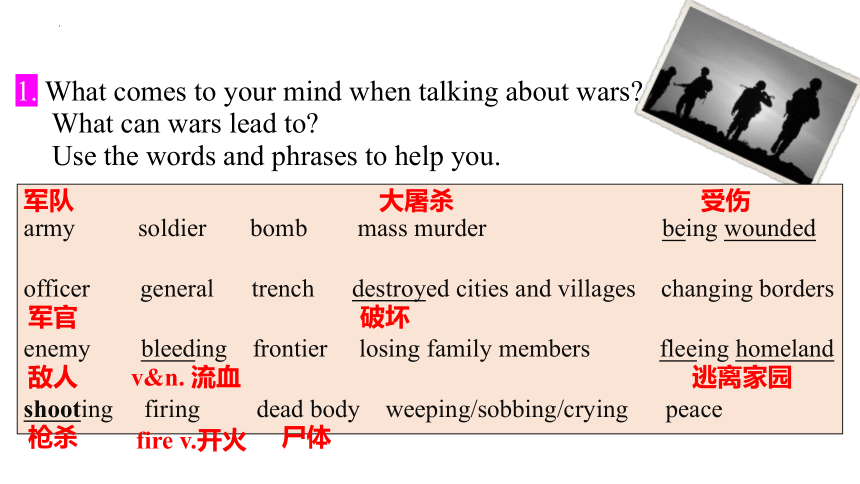
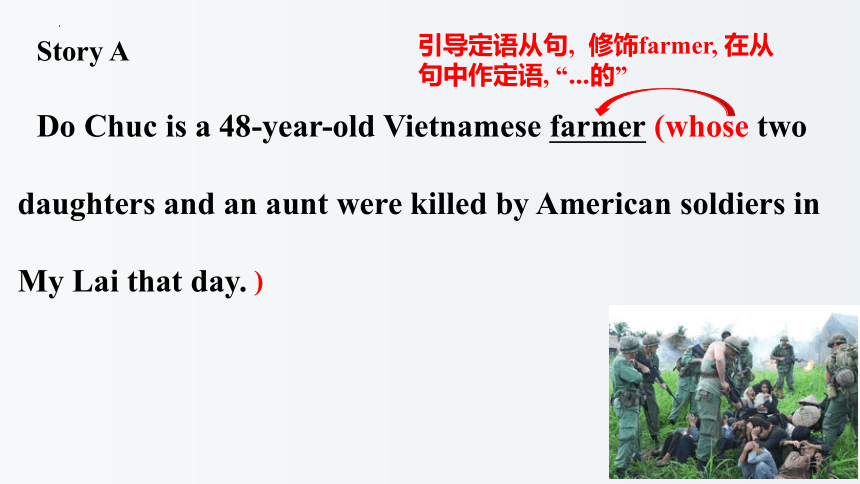
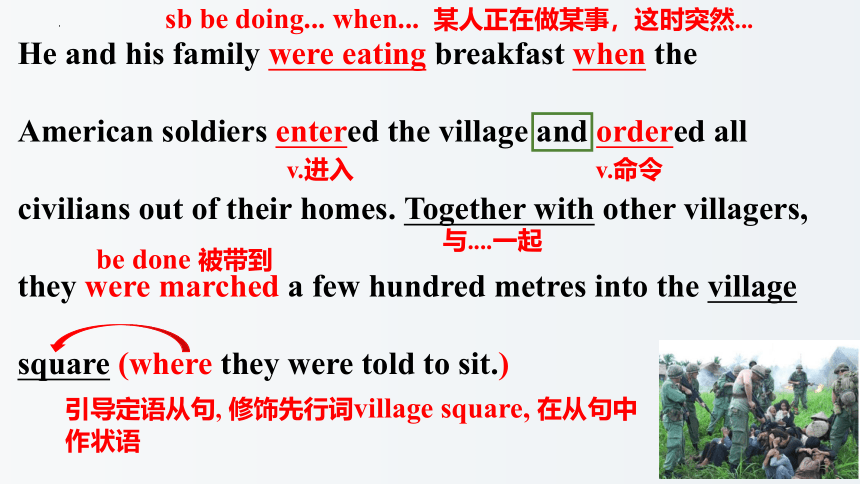
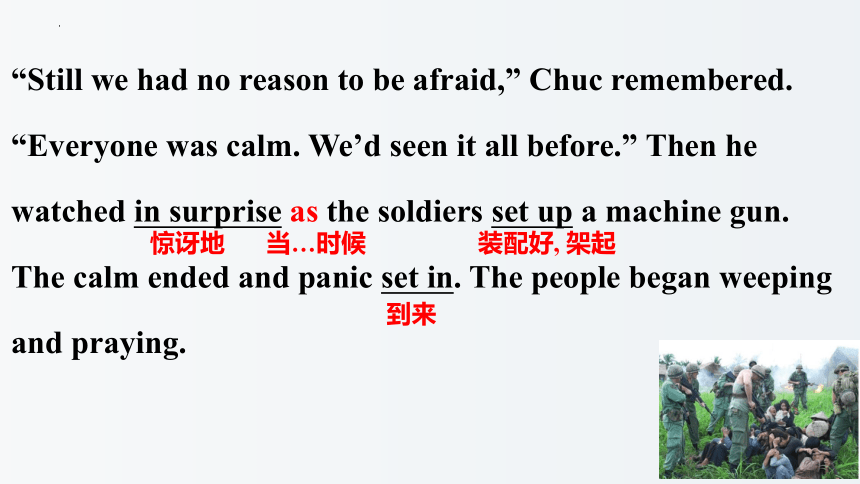
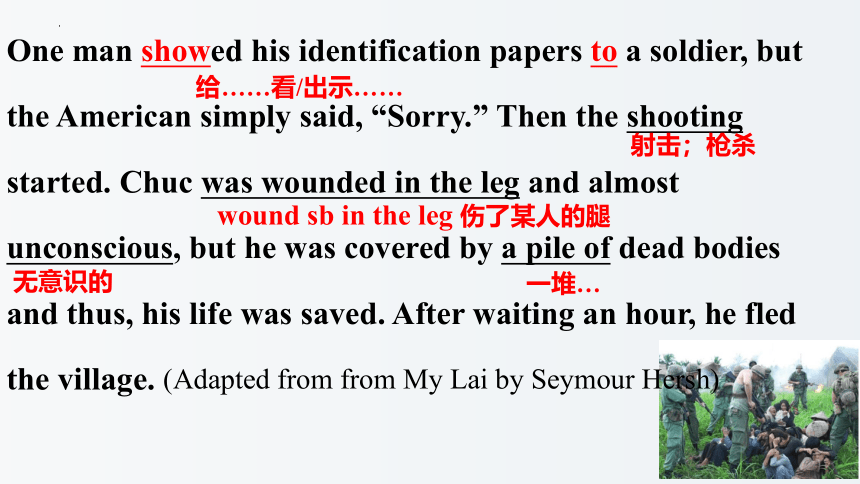
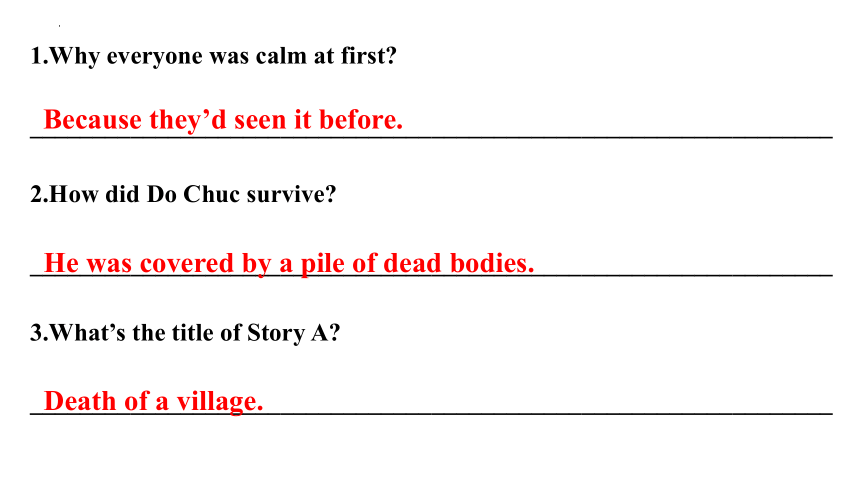
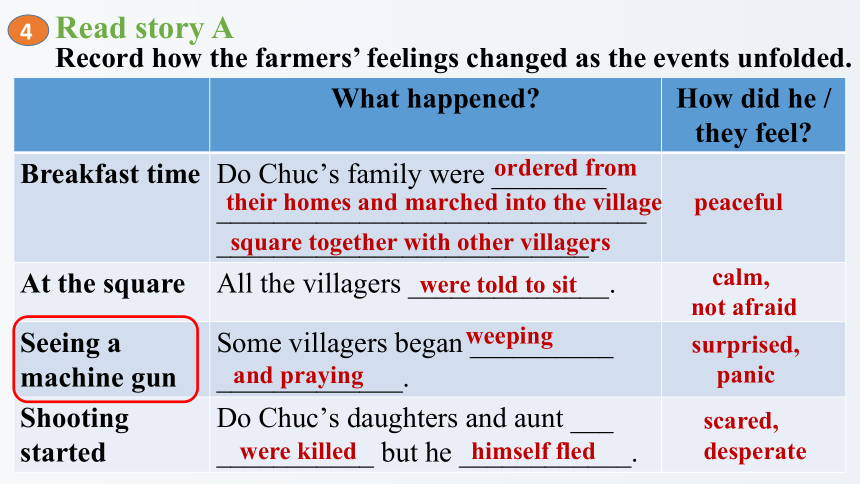

文档简介
(共25张PPT)
Unit11 Conflict and Compromise
Lesson3 War Memories
1. What comes to your mind when talking about wars
What can wars lead to
Use the words and phrases to help you.
army soldier bomb mass murder being wounded
officer general trench destroyed cities and villages changing borders
enemy bleeding frontier losing family members fleeing homeland
shooting firing dead body weeping/sobbing/crying peace
大屠杀
受伤
军官
破坏
敌人
v&n. 流血
逃离家园
枪杀
fire v.开火
尸体
军队
Story A
Do Chuc is a 48-year-old Vietnamese farmer (whose two daughters and an aunt were killed by American soldiers in My Lai that day. )
引导定语从句, 修饰farmer, 在从句中作定语, “...的”
He and his family were eating breakfast when the American soldiers entered the village and ordered all civilians out of their homes. Together with other villagers, they were marched a few hundred metres into the village square (where they were told to sit.)
sb be doing... when... 某人正在做某事,这时突然...
与....一起
be done 被带到
引导定语从句, 修饰先行词village square, 在从句中作状语
v.进入
v.命令
“Still we had no reason to be afraid,” Chuc remembered. “Everyone was calm. We’d seen it all before.” Then he watched in surprise as the soldiers set up a machine gun. The calm ended and panic set in. The people began weeping and praying.
惊讶地
当…时候
装配好, 架起
到来
One man showed his identification papers to a soldier, but the American simply said, “Sorry.” Then the shooting started. Chuc was wounded in the leg and almost unconscious, but he was covered by a pile of dead bodies and thus, his life was saved. After waiting an hour, he fled the village. (Adapted from from My Lai by Seymour Hersh)
给……看/出示……
射击;枪杀
wound sb in the leg 伤了某人的腿
无意识的
一堆…
1.Why everyone was calm at first
________________________________________________________________
2.How did Do Chuc survive
________________________________________________________________
3.What’s the title of Story A
________________________________________________________________
Because they’d seen it before.
He was covered by a pile of dead bodies.
Death of a village.
Read story A
Record how the farmers’ feelings changed as the events unfolded.
4
What happened How did he / they feel
Breakfast time Do Chuc’s family were ________ ________________________________________________________.
At the square All the villagers ______________.
Seeing a machine gun Some villagers began __________ _____________.
Shooting started Do Chuc’s daughters and aunt ___ ___________ but he ____________.
ordered from
their homes and marched into the village
square together with other villagers
peaceful
were told to sit
weeping
and praying
were killed
himself fled
calm,
not afraid
surprised,
panic
scared,
desperate
Story A
1. What is the turning point of the story
The American soldier set up a machine gun and began to shoot the villagers.
2. What does the author of the story try to convey
The author tries to describe the cruelty of wars, which claim the lives of many innocent civilians.
Story B
We were on the frontier and on Christmas morning we stuck up a board displaying: “A Merry Christmas” on it. The enemy had stuck up a similar one. Two of our men then threw their equipment off and climbed out of the trench with their hands above their heads as our representatives. Two of the Germans did the same.
那时我们在前线。圣诞节早晨我们竖起一块牌子,上面写着“圣诞快乐”。敌人也竖起了一块差不多的牌子。然后,我们的两名士兵脱下装备,爬出战壕,双手举过头顶,作为我方代表。两名德军士兵也这样做了。
在前线
stick-stuck-stuck 竖起
牌子上面写着… display和board之间是主动的关系
throw-threw-thrown 扯掉,甩掉
with+n+介词短语 eg:with a book in hand
从...出来/离开
They greeted each other and shook hands. Then we all got out of the trench. Bill (our officer) tried to prevent it but it was too late, so he and the other officers climbed out, too. We, and the Germans, walked through the mud and met in the middle of no-man’s land.
他们互相打招呼并握手,然后我们所有人都走出战壕。比尔(我们的军官)试图阻止这一切,但为时已晚,因此他和其他军官也都爬了出来。我们和德国人穿过泥泞,在无人地带中间相聚。
get out of… 离开……
shake hands 握手
—shook—shaken
在...中间
We spent all day with one another. Some of them could speak English. By the look of them, their trenches were in as bad a state as our own. One of their men, speaking in English, said that he had worked in England for some years and that he was fed up to the neck with this war and would be glad when it was over. We told him he wasn’t the only one (who was fed up with it.)
我们一起待了一整天。他们中有些人会说英语。从样子上可以看出,他们的战壕和我们的一样糟糕。他们中的一个人用英语说,他在英国工作过几年,受够了这场战争,如果战争结束,他会很高兴。我们告诉他,我们也同样受够了这场战争。
spend+时间 with sb. 花费时间和某人在一起
n.表情 v.看
in a...state 处在…的状态
插入语, v.用非谓语形式
said+2个that引导的宾语从句,表并列
对…厌烦透了
one指代“人”, who引导定语从句,修饰限定one
彼此,相互
和...一样糟糕
The German officer asked Bill (if we would like some beer) and they brought them over to us. Bill distributed the beer among us and we consumed a lot. The officers came to an understanding (that we would celebrate Christmas in temporary peace until midnight. )
德国军官问比尔要不要来点儿啤酒,他们拿过来送给我们。比尔把啤酒分给大家,我们喝了很多。双方军官达成共识,午夜之前我们将暂时和平地庆祝圣诞节。
if “是否”引导宾语从句, 作ask的宾语
把...分发给...
bring...over to sb 把...带给某人
v.消耗,吃,喝
达成共识
that引导同位语从句,解释说明understanding
和平地
Just before midnight, we all decided not to start firing before they did. We’d formed a bond and during the whole of Boxing Day, we never fired a shot and they the same; each side seemed to be waiting for the other to set the ball rolling.
临近午夜,我们都决定在对方开枪之前不先开枪。我们达成了一种默契,整个节礼日,我们都没有开过一枪,他们也一样;双方似乎都在等对方先开火。
立下契约
shot n.开枪;shoot v.开枪 (shot)
开枪
开始做某事
wait for sb to do sth
等待某人去做某事
One of their men shouted across in English and asked (how we had enjoyed the beer.) We replied (that we were very grateful and spent the whole day chatting with them). That evening we were replaced by other soldiers.
他们中的一个人用英语大喊,问我们啤酒怎么样,我们回答说非常感谢他们的啤酒,接下来一整天双方都在聊天。那天晚上,我们被其他部队替换下来了。
how “如何”引导宾语从句,作ask的宾语
that引导宾语从句,作reply的宾语
spend+时间(in) doing sth with sb 花费时间和某人做某事
be replaced by 被...取代
1.(T/F) The soldiers were still on the frontiers on Christmas morning.( )
2.(T/F) Both the British and the Germans hated the war.( )
3.Both of the troops were fed up with the war, so______.
A.they gave up the war
B.they got together to celebrate Christmas
C.they didn’t fire a shot any more.
D.they made friends with each other
T
T
B
2. How long were the soldiers in peace with each other in Story B
A. One night B. One day
C. One night and one day D. One night and two days
Story C
I got a phone call from the chief nurse, saying, “You’ve got a patient there who is going to get an award. Make sure that the ward looks good.” This really turned me off to begin with, “Let's clean up the ward because we’ve got VIPs coming in.”
定语从句
我接到护士长的电话,她说:“你那儿有个病人要得奖了,务必确保病房干净整洁。”这打一开始就让我很反感“我们打扫病房吧,因为有贵宾要来。”
宾语从句
chief 主要的
护士长
非谓语:主动关系
n.病人 adj.耐心的
确保
使我厌烦
起初 =at first
in the beginning
打扫,清理
非谓语:
主动关系
Story C
Well, the VIPs happened to be a general and a group of about a dozen people. It was this patient’s second visit to us and this time he’d had both his legs blown off — he was all-of-about 20 years old.
恰好是……
十来个
he had had... 过去完成时
have +宾语(sth) +宾补(done) (让某事被做)
使 双腿(某事) 被炸掉
嗯,贵宾是一名将军和十几号人的随从。这是这位病人第二次来到我们这里,而这次他的双腿都被炸没了——他也就才二十几岁。
blow—blew—blown v.刮风,吹,炸毁
大约
Story C
When he was waking up after the surgeon had finished, he whispered, “Don’t you remember me, ma’am ” I said, “Oh yeah!” But really I didn’t because there were so many of them.
wake up 醒来
进行时表示“慢慢醒来”的状态
外科医生
低声说; 耳语
做完手术后他慢慢苏醒过来,小声说:“你不记得我了吗,女士?”我说:“哦,当然记得你!”但其实我对他没有印象,因为这里的伤员太多了。
将军是来给他颁奖的因为他正好是这家医院的第20000个病人。他们举办了一个小小的仪式,给他颁发一枚紫心勋章和一块手表
The general was coming to give him the award because he
happened to be number 20,000 to come through this hospital.
They had this little ceremony, (where they presented him with
a Purple Heart and a watch).
number+基数词+ to do 第几个做...的
where引导的非限制性定语从句,修饰先行词ceremony,表地点
恰好是
present sb with sth
给某人颁发某物
经历
9 (additional), poets would visit local taverns, 10 they would enjoy foreign dancers’ fascinating movements and melodious singing, while tasting wine and crafting verses of poetry.
A Canadian soldier saw bright-red poppies blooming, the touching sight of 5 moved him to write the famous poem “In Flanders Fields”.
As the general handed him the watch, “from the army, to show
our appreciation,” the kid more or less threw the watch back at
him. He said something like, “I can’t accept this, sir; it’s not
going to help me walk.” After this little incident, I went over
and took him in my arms. If I remember correctly, I started
sobbing and I think he was crying, too. I really admired him
for that.
将军把那块“来自军队,以表示我们的感谢”的表递给他时,那孩子几乎是把表扔了回去。他说了几句话,大概意思是“我不能要这块表,长官,因为他不能帮助我走路”这件小插曲之后,我走过去把他搂在怀里。如果我没记错的话,我哭了,我想他应该也哭了。我真的很佩服他能那么做
在...时
hand sb sth 递给某人某物
差不多,几乎
go over 走过去
take sb in one’s arms 把某人拥入怀中
将会
他那么做是很需要勇气的,这也多少反映了我对这场战争的看法。
That was the only time I let somebody see what I felt.
It took a lot for him to do that, and it sort of said what this war
was all about to me.
此处为省略when的定语从句(用作时间状语的关系副词when通常不能省略,但先行词为day, year, time等时可以省略)
what引导的宾语从句
it作形式主语,to do不定式是真正的主语
what引导的宾语从句
多少
我的真实情感
1. Whose memory is it in Story C
2. Why was the patient in the hospital in Story C
It is a nurse’s memory.
Because he had had both his legs blown off.
3. Why did the soldier refuse the watch ( )A. He didn’t like the watch.B. He thought the watch was too expensive.C. He thought the watch couldn’t replace his legs.D. He thought other soldiers would be better worth the watch.4.Why did the author begin sobbing ( )A. She admired the soldier and was moved by him.B. She felt sorry for that she couldn’t save the soldier’s legs.C. The soldiers made her think of her son.D. The war was cruel.
C
A
Unit11 Conflict and Compromise
Lesson3 War Memories
1. What comes to your mind when talking about wars
What can wars lead to
Use the words and phrases to help you.
army soldier bomb mass murder being wounded
officer general trench destroyed cities and villages changing borders
enemy bleeding frontier losing family members fleeing homeland
shooting firing dead body weeping/sobbing/crying peace
大屠杀
受伤
军官
破坏
敌人
v&n. 流血
逃离家园
枪杀
fire v.开火
尸体
军队
Story A
Do Chuc is a 48-year-old Vietnamese farmer (whose two daughters and an aunt were killed by American soldiers in My Lai that day. )
引导定语从句, 修饰farmer, 在从句中作定语, “...的”
He and his family were eating breakfast when the American soldiers entered the village and ordered all civilians out of their homes. Together with other villagers, they were marched a few hundred metres into the village square (where they were told to sit.)
sb be doing... when... 某人正在做某事,这时突然...
与....一起
be done 被带到
引导定语从句, 修饰先行词village square, 在从句中作状语
v.进入
v.命令
“Still we had no reason to be afraid,” Chuc remembered. “Everyone was calm. We’d seen it all before.” Then he watched in surprise as the soldiers set up a machine gun. The calm ended and panic set in. The people began weeping and praying.
惊讶地
当…时候
装配好, 架起
到来
One man showed his identification papers to a soldier, but the American simply said, “Sorry.” Then the shooting started. Chuc was wounded in the leg and almost unconscious, but he was covered by a pile of dead bodies and thus, his life was saved. After waiting an hour, he fled the village. (Adapted from from My Lai by Seymour Hersh)
给……看/出示……
射击;枪杀
wound sb in the leg 伤了某人的腿
无意识的
一堆…
1.Why everyone was calm at first
________________________________________________________________
2.How did Do Chuc survive
________________________________________________________________
3.What’s the title of Story A
________________________________________________________________
Because they’d seen it before.
He was covered by a pile of dead bodies.
Death of a village.
Read story A
Record how the farmers’ feelings changed as the events unfolded.
4
What happened How did he / they feel
Breakfast time Do Chuc’s family were ________ ________________________________________________________.
At the square All the villagers ______________.
Seeing a machine gun Some villagers began __________ _____________.
Shooting started Do Chuc’s daughters and aunt ___ ___________ but he ____________.
ordered from
their homes and marched into the village
square together with other villagers
peaceful
were told to sit
weeping
and praying
were killed
himself fled
calm,
not afraid
surprised,
panic
scared,
desperate
Story A
1. What is the turning point of the story
The American soldier set up a machine gun and began to shoot the villagers.
2. What does the author of the story try to convey
The author tries to describe the cruelty of wars, which claim the lives of many innocent civilians.
Story B
We were on the frontier and on Christmas morning we stuck up a board displaying: “A Merry Christmas” on it. The enemy had stuck up a similar one. Two of our men then threw their equipment off and climbed out of the trench with their hands above their heads as our representatives. Two of the Germans did the same.
那时我们在前线。圣诞节早晨我们竖起一块牌子,上面写着“圣诞快乐”。敌人也竖起了一块差不多的牌子。然后,我们的两名士兵脱下装备,爬出战壕,双手举过头顶,作为我方代表。两名德军士兵也这样做了。
在前线
stick-stuck-stuck 竖起
牌子上面写着… display和board之间是主动的关系
throw-threw-thrown 扯掉,甩掉
with+n+介词短语 eg:with a book in hand
从...出来/离开
They greeted each other and shook hands. Then we all got out of the trench. Bill (our officer) tried to prevent it but it was too late, so he and the other officers climbed out, too. We, and the Germans, walked through the mud and met in the middle of no-man’s land.
他们互相打招呼并握手,然后我们所有人都走出战壕。比尔(我们的军官)试图阻止这一切,但为时已晚,因此他和其他军官也都爬了出来。我们和德国人穿过泥泞,在无人地带中间相聚。
get out of… 离开……
shake hands 握手
—shook—shaken
在...中间
We spent all day with one another. Some of them could speak English. By the look of them, their trenches were in as bad a state as our own. One of their men, speaking in English, said that he had worked in England for some years and that he was fed up to the neck with this war and would be glad when it was over. We told him he wasn’t the only one (who was fed up with it.)
我们一起待了一整天。他们中有些人会说英语。从样子上可以看出,他们的战壕和我们的一样糟糕。他们中的一个人用英语说,他在英国工作过几年,受够了这场战争,如果战争结束,他会很高兴。我们告诉他,我们也同样受够了这场战争。
spend+时间 with sb. 花费时间和某人在一起
n.表情 v.看
in a...state 处在…的状态
插入语, v.用非谓语形式
said+2个that引导的宾语从句,表并列
对…厌烦透了
one指代“人”, who引导定语从句,修饰限定one
彼此,相互
和...一样糟糕
The German officer asked Bill (if we would like some beer) and they brought them over to us. Bill distributed the beer among us and we consumed a lot. The officers came to an understanding (that we would celebrate Christmas in temporary peace until midnight. )
德国军官问比尔要不要来点儿啤酒,他们拿过来送给我们。比尔把啤酒分给大家,我们喝了很多。双方军官达成共识,午夜之前我们将暂时和平地庆祝圣诞节。
if “是否”引导宾语从句, 作ask的宾语
把...分发给...
bring...over to sb 把...带给某人
v.消耗,吃,喝
达成共识
that引导同位语从句,解释说明understanding
和平地
Just before midnight, we all decided not to start firing before they did. We’d formed a bond and during the whole of Boxing Day, we never fired a shot and they the same; each side seemed to be waiting for the other to set the ball rolling.
临近午夜,我们都决定在对方开枪之前不先开枪。我们达成了一种默契,整个节礼日,我们都没有开过一枪,他们也一样;双方似乎都在等对方先开火。
立下契约
shot n.开枪;shoot v.开枪 (shot)
开枪
开始做某事
wait for sb to do sth
等待某人去做某事
One of their men shouted across in English and asked (how we had enjoyed the beer.) We replied (that we were very grateful and spent the whole day chatting with them). That evening we were replaced by other soldiers.
他们中的一个人用英语大喊,问我们啤酒怎么样,我们回答说非常感谢他们的啤酒,接下来一整天双方都在聊天。那天晚上,我们被其他部队替换下来了。
how “如何”引导宾语从句,作ask的宾语
that引导宾语从句,作reply的宾语
spend+时间(in) doing sth with sb 花费时间和某人做某事
be replaced by 被...取代
1.(T/F) The soldiers were still on the frontiers on Christmas morning.( )
2.(T/F) Both the British and the Germans hated the war.( )
3.Both of the troops were fed up with the war, so______.
A.they gave up the war
B.they got together to celebrate Christmas
C.they didn’t fire a shot any more.
D.they made friends with each other
T
T
B
2. How long were the soldiers in peace with each other in Story B
A. One night B. One day
C. One night and one day D. One night and two days
Story C
I got a phone call from the chief nurse, saying, “You’ve got a patient there who is going to get an award. Make sure that the ward looks good.” This really turned me off to begin with, “Let's clean up the ward because we’ve got VIPs coming in.”
定语从句
我接到护士长的电话,她说:“你那儿有个病人要得奖了,务必确保病房干净整洁。”这打一开始就让我很反感“我们打扫病房吧,因为有贵宾要来。”
宾语从句
chief 主要的
护士长
非谓语:主动关系
n.病人 adj.耐心的
确保
使我厌烦
起初 =at first
in the beginning
打扫,清理
非谓语:
主动关系
Story C
Well, the VIPs happened to be a general and a group of about a dozen people. It was this patient’s second visit to us and this time he’d had both his legs blown off — he was all-of-about 20 years old.
恰好是……
十来个
he had had... 过去完成时
have +宾语(sth) +宾补(done) (让某事被做)
使 双腿(某事) 被炸掉
嗯,贵宾是一名将军和十几号人的随从。这是这位病人第二次来到我们这里,而这次他的双腿都被炸没了——他也就才二十几岁。
blow—blew—blown v.刮风,吹,炸毁
大约
Story C
When he was waking up after the surgeon had finished, he whispered, “Don’t you remember me, ma’am ” I said, “Oh yeah!” But really I didn’t because there were so many of them.
wake up 醒来
进行时表示“慢慢醒来”的状态
外科医生
低声说; 耳语
做完手术后他慢慢苏醒过来,小声说:“你不记得我了吗,女士?”我说:“哦,当然记得你!”但其实我对他没有印象,因为这里的伤员太多了。
将军是来给他颁奖的因为他正好是这家医院的第20000个病人。他们举办了一个小小的仪式,给他颁发一枚紫心勋章和一块手表
The general was coming to give him the award because he
happened to be number 20,000 to come through this hospital.
They had this little ceremony, (where they presented him with
a Purple Heart and a watch).
number+基数词+ to do 第几个做...的
where引导的非限制性定语从句,修饰先行词ceremony,表地点
恰好是
present sb with sth
给某人颁发某物
经历
9 (additional), poets would visit local taverns, 10 they would enjoy foreign dancers’ fascinating movements and melodious singing, while tasting wine and crafting verses of poetry.
A Canadian soldier saw bright-red poppies blooming, the touching sight of 5 moved him to write the famous poem “In Flanders Fields”.
As the general handed him the watch, “from the army, to show
our appreciation,” the kid more or less threw the watch back at
him. He said something like, “I can’t accept this, sir; it’s not
going to help me walk.” After this little incident, I went over
and took him in my arms. If I remember correctly, I started
sobbing and I think he was crying, too. I really admired him
for that.
将军把那块“来自军队,以表示我们的感谢”的表递给他时,那孩子几乎是把表扔了回去。他说了几句话,大概意思是“我不能要这块表,长官,因为他不能帮助我走路”这件小插曲之后,我走过去把他搂在怀里。如果我没记错的话,我哭了,我想他应该也哭了。我真的很佩服他能那么做
在...时
hand sb sth 递给某人某物
差不多,几乎
go over 走过去
take sb in one’s arms 把某人拥入怀中
将会
他那么做是很需要勇气的,这也多少反映了我对这场战争的看法。
That was the only time I let somebody see what I felt.
It took a lot for him to do that, and it sort of said what this war
was all about to me.
此处为省略when的定语从句(用作时间状语的关系副词when通常不能省略,但先行词为day, year, time等时可以省略)
what引导的宾语从句
it作形式主语,to do不定式是真正的主语
what引导的宾语从句
多少
我的真实情感
1. Whose memory is it in Story C
2. Why was the patient in the hospital in Story C
It is a nurse’s memory.
Because he had had both his legs blown off.
3. Why did the soldier refuse the watch ( )A. He didn’t like the watch.B. He thought the watch was too expensive.C. He thought the watch couldn’t replace his legs.D. He thought other soldiers would be better worth the watch.4.Why did the author begin sobbing ( )A. She admired the soldier and was moved by him.B. She felt sorry for that she couldn’t save the soldier’s legs.C. The soldiers made her think of her son.D. The war was cruel.
C
A
同课章节目录
- Unit 10 Connections
- Lesson 1 How Closely Connected Are We?
- Lesson 2 Community Spirit
- Lesson 3 Anne of Green Gables
- Unit 11 Conflict And Compromise
- Lesson 1 Living In a Community
- Lesson 2 Dealing with Conflict
- Lesson 3 War Memories
- Unit 12 Innovation
- Lesson 1 Scientific Breakthroughs
- Lesson 2 Aha Moment
- Lesson 3 Stephen Hawking
